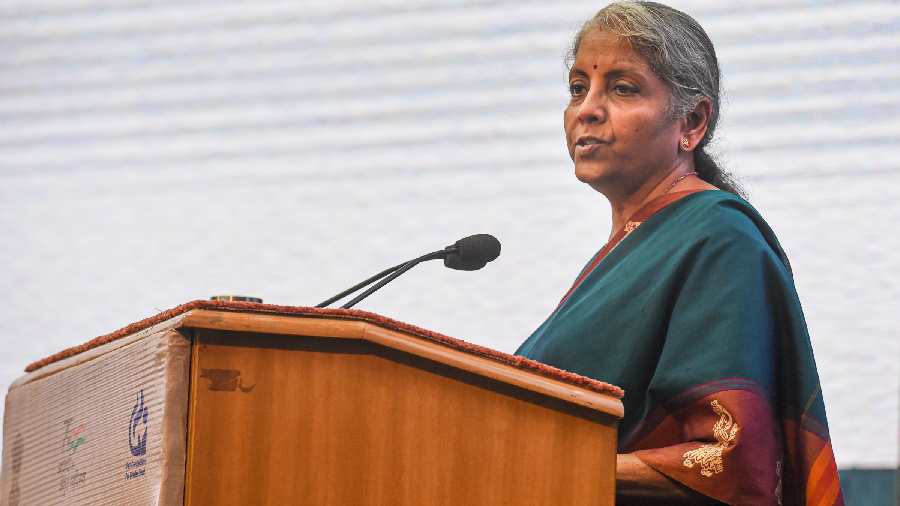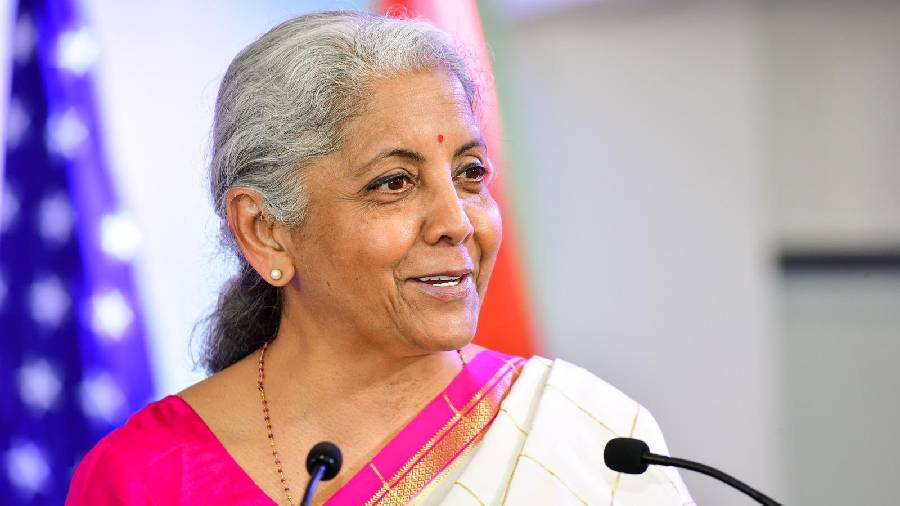Finance Minister Nirmala Sitharaman on Friday said "cartelisation is going to be a challenge" and stressed on the need to look at supply disruptions in order to ensure that there are no monopolistic or duopolistic situations causing either price hikes or supply manipulations.
Amidst rising inflation which has also raised concerns about the economic recovery from the coronavirus pandemic, the minister said there are a few grievances that input costs of materials have gone up in spite of India having quite a big capacity to meet the country's own demands and also for exports.
There is a global shortage of commodities and raw materials as well as disruptions in the value chains and supply chains due to the pandemic and the war situation in Eastern Europe, she noted.
Addressing the 13th annual day function of the Competition Commission of India (CCI) in the national capital, Sitharaman said there are disruptions of various kinds.
"There are very many stages at which disruptions are coming in. Are they genuinely disruptions caused by COVID or war, there is a need to look into these disruptions, look into the causes for the short supply and also assure that there are no monopolistic or duopolistic situations causing either price hikes or supply manipulations," the minister said.
Sitharaman, who is also in charge of the corporate affairs ministry, said in the last two years, the CCI has stood up and met the challenges with a lot more positivity.
"Challenges are getting more complex, more nuanced and more technology-driven. So, the Competition Commission will have to have such skill sets so that you are never behind the curve and you are on top of the issues," she said.
According to her, cartelisation is going to be a challenge also due to companies scaling up and growing into areas that are of great demand.
"There could be a situation where cartelisation is a possible threat... Cartelisation is the larger word I am using and cartelisation itself is a self-explanatory word but I am also bringing smaller elements of other things which eventually make commodities more expensive," the minister said.
Noting that the government wants the recovery from the pandemic to be distinctly clear and speedy, she said companies have to scale up to and meet new challenges.
"Scaling up is a proposition before us and it has to be happening in the market. Therefore, CCI will have to be very understanding of what is happening... generally on what is this scaling up leading to.
"There is a need for a proactive understanding of whatever developments in the name of mergers and acquisitions... I am not saying that you straight away engage based on what you have understood but the knowledge you keep acquiring... is going to keep you informed better in handling cases," Sitharaman said.
In the context of digitisation, the minister said that calibrated challenges and calibrated responses are both the realities before us.
Delving into the topic, Sitharaman said that though tools of digitisation are the market forces being effectively, fairly and transparently used for the benefit of consumers, there is something which raises a question.
While mentioning that the CCI should have a greater understanding and therefore greater leverage to see how best the digitisation moving across various sectors is having an impact, she said, "be sensitive, be firm".
Corporate Affairs Secretary Rajesh Verma said CCI has made critical interventions to deal with anti-competition matters.
He said the recommendations made by the Competition Law Review Committee (CLRC) are being examined in the light of stakeholder consultations.
Among other recommendations, the CLRC, which had submitted its report to the government in July 2019, pitched for a settlement mechanism to address antitrust disputes. Amendments to the Competition Act are also on the cards.
The CCI Chairperson Ashok Kumar Gupta said that over the last 13 years, the regulator has developed a sound body of jurisprudence across sectors.
"In 13 years, the CCI has reviewed over 1,100 antitrust cases, 900 combinations and held over 1,200 advocacy events. However, more than the numbers reveal, the CCI in these years has developed a sound body of jurisprudence across diverse sectors of the economy for engaging with various stakeholders," he said.
While market distortions need to be corrected promptly, Gupta said it was equally important that incentives for innovations are not compromised.
Going forward, Gupta said there is a need to sharpen tool kits for antitrust and mergers to account for the data-centric ecosystem as India has emerged as one of the biggest and fastest growing digital consumer bases.
Citing global developments, the CCI chief said that due to unique features of the digital markets, some ex-ante legislative measures may be required to supplement existing ex-post antitrust rules in regulating big tech in an effective and robust manner.
Sitharaman also virtually inaugurated the CCI's Eastern regional office in Calcutta. This is the second regional office after the Southern regional office in Chennai was inaugurated last year.












